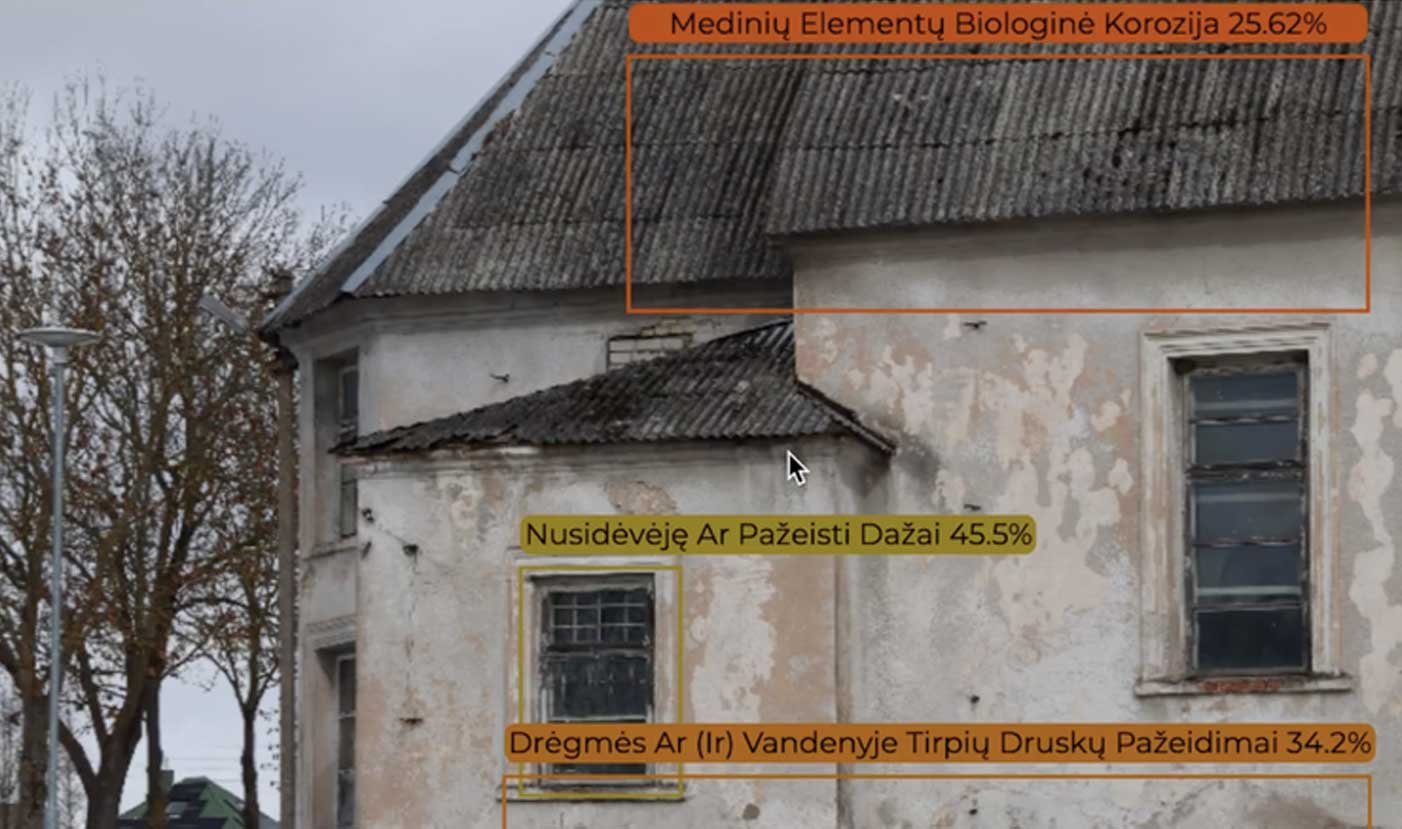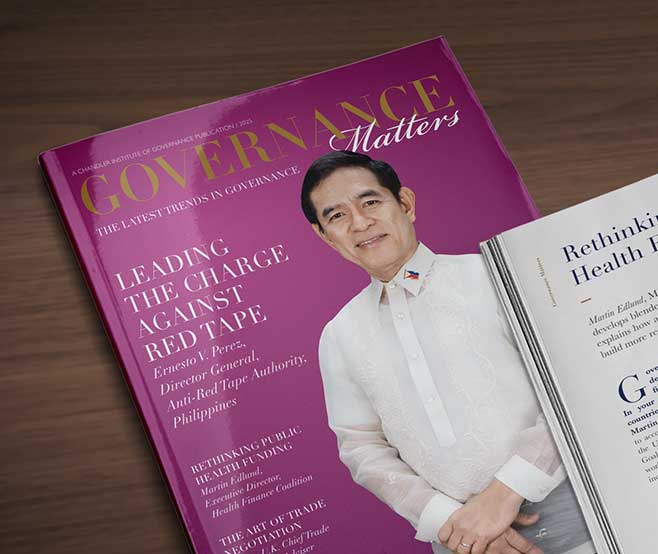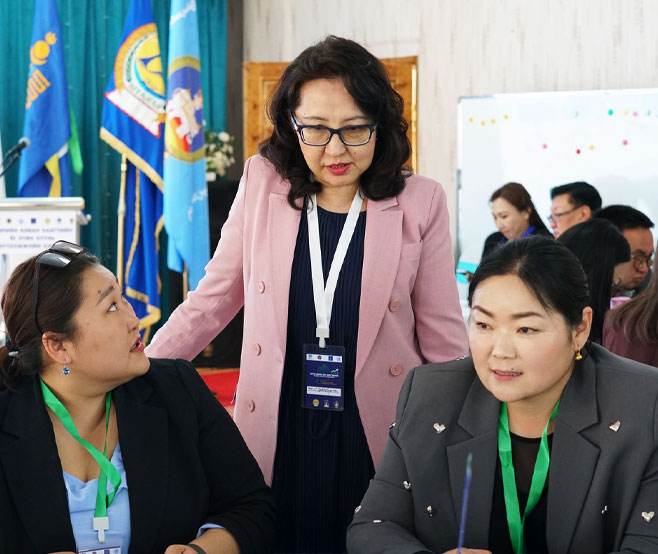Ministry of the Future
Governance Matters speaks with Kristel Van der Elst, Director General of Policy Horizons Canada, a federal government organisation helping the Canadian government develop future-oriented policies and programmes.
Lorem ipsum dolor sit amet, consectetur adipiscing elit, sed do eiusmod tempor incididunt ut labore et dolore magna aliqua. Ut enim ad minim veniam, quis nostrud exercitation ullamco laboris nisi ut aliquip ex ea commodo consequat. Duis aute irure dolor in reprehenderit in voluptate velit esse cillum dolore eu fugiat nulla pariatur.
Heading 1
Heading 2
Heading 3
Heading 4
Heading 5
Heading 6
Lorem ipsum dolor sit amet, consectetur adipiscing elit, sed do eiusmod tempor incididunt ut labore et dolore magna aliqua. Ut enim ad minim veniam, quis nostrud exercitation ullamco laboris nisi ut aliquip ex ea commodo consequat. Duis aute irure dolor in reprehenderit in voluptate velit esse cillum dolore eu fugiat nulla pariatur.
Block quote
Heading 6
Ordered list
- Item 1
- Item 2
- Item 3
Unordered list
- Item A
- Item B
- Item C
Bold text
Emphasis
Superscript
Subscript
A 2021 report commissioned by the U.K. government looked at the foresight capabilities of more than 16 countries, analysing eight of them in greater detail. Among those studied was Canada — and more specifically an organisation within the Canadian government called Policy Horizons. The report gave Canada — and by extension, Policy Horizons — the highest possible score in two areas: ‘activity across the ecosystem’ and ‘impact at systems level’.
Canada’s efforts to formally integrate planning for the future into its government date back to the end of World War II, with the creation of the Ministry of State and Technology in 1945. The government experimented with different structures, bodies, and research outfits until Policy Horizons — an organisation explicitly focused on strategic foresight — was officially created in 2010.
Through multiple administrations, Policy Horizons has grown in size and influence. Today, it produces a number of foresight studies that are informed by, and which also inform, Canada’s most senior decision-makers. It also trains public servants, cultivates a foresight network across multiple government departments, and helps departments and agencies bolster their own foresight capabilities.
Leading the organisation is Kristel Van der Elst, who has served as Policy Horizons’ Director General since 2018. Before joining Policy Horizons, Van der Elst was Head of Strategic Foresight at the World Economic Forum for almost a decade. In a recent conversation with Governance Matters, she explained why foresight remains vital — rather than a luxury — in times of crisis. “Every decision a government makes has long-term consequences,” she says. “And in a crisis, given how many decisions you’re making each second, each day, your choices bake the future in very quickly.”
Governance Matters: Could an organisation like Policy Horizons work in other countries? Or is it an approach and structure uniquely suited to Canada?
Kristel Van der Elst: It could work anywhere. When you’re in the public service, you’re supposed to take care of your country for the future. That’s part of the job description. Every country should have foresight capabilities, and a lot of countries already do in some form. Singapore and Finland, for example, have strong foresight experience. The European Commission, since 2015, has approached foresight in a more structured, formalised way: one of its Vice-Presidents [Maroš Šefčovič] is the first ever member of the College of Commissioners in charge of strategic foresight. The Strategic Foresight Unit at the OECD sits within the Office of the Secretary-General. You have units being built at the IMF and the UN. There’s real demand for it.
It’s not always external-facing, and it can sit in different places. Foresight can often be treated like a research department. It’s great to do research and have data, but if it doesn’t reach decision-makers, then it’s not nearly as useful.
Part of Policy Horizons’ mandate is to help the government of Canada “develop future-oriented policy and programs”. How do you approach such an important, ambitious goal in practice?
We adopt quite a few approaches: research, training, building networks. The research part sees us act a bit like a thinktank. We study key areas of change and uncertainty that Canada might face, across technological, economic, environmental, political, and geopolitical topics. We think about how they will affect the overall system and society we’re living in, and then bring that down to what it means for the policy landscape. We spend a lot of time engaging in conversations with different departments to cocreate work that will be useful for them — but we don’t tell them what they should do with our thinking. That’s their role.
How are you able to work across so many departments?
We’re privileged at Policy Horizons Canada to have a Deputy Minister Steering Committee that provides oversight, direction, and guidance to us. Also, a representative of the Privy Council Office, which supports the Prime Minister and Cabinet, sits on the Steering Committee. That allows us to bring our thought leadership to the highest ranks of the public service. It also allows us to work across the government. Because although we’re essentially sitting in one department, through the Committee, we have a number of deputy ministers from different departments involved. It really allows us to integrate and connect.

Manager Marcus Ballinger, Canada, 2019.
Another part of your work is to “build foresight literacy and capacity” across the Canadian Public Service. How does that work in practice?
We’re the central hub for foresight, let’s say, within the government of Canada, but we’re not the only ones doing foresight. It is happening in different departments — the Global Affairs department, for instance, has a foresight unit. There are a lot of people thinking about the future — senior advisers, those doing environment scanning — who don’t operate strictly under the label of foresight. We lead trainings. We launched our first Futures Week conference this year, which allowed public servants to explore the future, examine the changing policy landscapes, the opportunities and challenges we might face, and to learn about how foresight informs decision making. We also build networks, like the Federal Foresight Network, where we bring together people from different departments. We meet monthly to share processes, tools, lessons, and experiences, so we slowly build up the capacity within different departments.
Do you have any metrics that define what success or progress look like?
It’s tough to measure precisely. When someone makes a decision, they’re informed by many sources — how can you isolate the effect of one report or one conversation? Ultimately, it depends on the answers to these questions:
- Do the people that we’re serving feel that we bring value?
- Do they feel their decisions are better informed so they can incorporate that information into their decision making?
- Do they call on us?
- Do they ask our opinions?
What we’re seeing is that the demand on our services have increased tremendously — Policy Horizons has grown significantly in the last three years. There’s a lot of demand for foresight, but we also seem to be responding in a way that people find helpful.
What steps can other governments and public leaders take if they want to focus on foresight in government planning?
There are many important nuances, but I think it really boils down to these factors: Do we have the systems in place? Do we have the people with the right mindsets in place? You need the right people who believe in foresight. And you need the right infrastructure.
If leaders don’t make time for it, or don’t prioritise foresight, then it’s not going to happen. If you’re constantly in emergency mode, long-term thinking doesn’t happen or it doesn’t get prioritised. And if leaders never ask those questions, if there’s no infrastructure to take the time to ask those questions, it’s not going to happen.
It is also important to integrate at the right places. Where you sit matters — if you’re sidelined, it’s just not going to work. Foresight has to be hardwired into existing processes and systems; it has to be integrated into decision-making. Embedding means putting mechanisms in place that create space for people to think about the future when they create and discuss the policy — time on the agenda at important meetings, workshops scheduled, committees organised. Things like that.
There’s also something to be said for the right culture, instilling a ‘foresight mindset.’ You might be an expert in your field, but change often comes from across a system, in places you’re not an expert on. You need to work across different departments and policy areas to understand how things are going to play out and where change might come from. Are you open to collaborating, to having conversations?
People embrace foresight because they realise change is happening now, and they’re the ones who have to address it.
How can leaders not be in “emergency mode,” as you put it, when it seems like there’s an endless supply of emergencies demanding their attention?
During COVID-19, people rightly went into crisis mode: their focus narrowed to the end of the day, the end of the week. At Policy Horizons we said: “Let’s start thinking about some of the issues that might arise in six months, 12 months.” And we’ve had so much demand for our work because people didn’t have the time to be thinking about these issues in the way we could. The requests came from all levels of the public service, from high level decision makers to analysts, including people and organisations who might not have seen our value as clearly before.
My experience from doing this for 20 years in different organisations is that when things go well — when the world is growing, and it’s all relatively peaceful — there’s actually less demand for foresight. Because the assumption is often that things will continue to go well. But in times of crisis or disruption, people embrace foresight because they realise change is happening now, and they’re the ones who have to address it.”

Heading 1
Heading 2
Heading 3
Heading 4
Heading 5
Heading 6
Lorem ipsum dolor sit amet, consectetur adipiscing elit, sed do eiusmod tempor incididunt ut labore et dolore magna aliqua. Ut enim ad minim veniam, quis nostrud exercitation ullamco laboris nisi ut aliquip ex ea commodo consequat. Duis aute irure dolor in reprehenderit in voluptate velit esse cillum dolore eu fugiat nulla pariatur.

Block quote
Ordered list
- Item 1
- Item 2
- Item 3
Unordered list
- Item A
- Item B
- Item C
Bold text
Emphasis
Superscript
Subscript
Lorem ipsum dolor sit amet, consectetur adipiscing elit, sed do eiusmod tempor incididunt ut labore et dolore magna aliqua. Ut enim ad minim veniam, quis nostrud exercitation ullamco laboris nisi ut aliquip ex ea commodo consequat. Duis aute irure dolor in reprehenderit in voluptate velit esse cillum dolore eu fugiat nulla pariatur.
Endnotes
- Item 1
- Item 2
- Item 3


Kristel Van der Elst is the Director General at Policy Horizons Canada, Government of Canada. She is former Head of Strategic Foresight at the World Economic Forum. Kristel holds three master’s degrees including an MBA from the Yale School of Management. She is a Fulbright Scholar and a Rotary Foundation Ambassadorial Scholar.
Lorem ipsum dolor sit amet, consectetur adipiscing elit, sed do eiusmod tempor incididunt ut labore et dolore magna aliqua. Ut enim ad minim veniam, quis nostrud exercitation ullamco laboris nisi ut aliquip ex ea commodo consequat. Duis aute irure dolor in reprehenderit in voluptate velit esse cillum dolore eu fugiat nulla pariatur.













